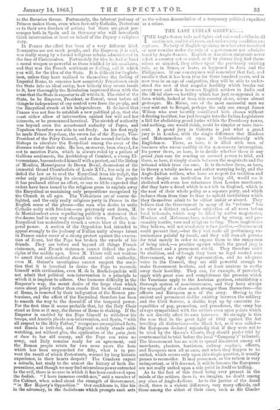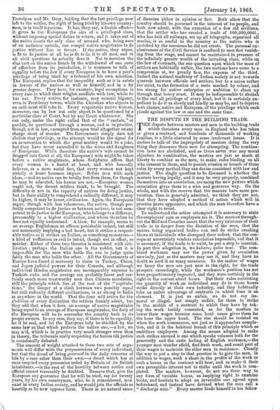In France the effect has been of a very different
kind. cept one. No body of English-speaking men has ever remained
Gallican sentiments, the Archbishop of Cambrai, a strong prim gi fade case for sending an accused person to trial, and tramontane, hascontented himself with a protest, and the Bishop there, as here, it simply stands between the magistrate and the of Moulins, Monseigneur de Dreux Breze, descendant of the tribunal which tries the case. It is therefore there, as here, immortal. Grand Chamberlain of Louis XVI., has only so far in theory a totally useless and rather worryine.° body, and the defied the law as to read the Encyclical from his pulpit, the Anglo-Indian settlers, who have no respect for tradition and order only prohibiting its circulation. Among the people rather despise an institution for being old, would see it it has produced either no effect, or one so little expected that abolished with even less reluctance than London merchants. orders have been issued to the religious press to explain away But they have a dread. which is not felt in England, which is the Encyclical as containing only propositions recognized. by the root of their whole policy as a separate party, and which the Church in all ages. The Voltairians are of course de- induces them from time to time to uphold institutions which lighted, and the only really religious party in France in. the they themselves admit to be either unfair or absurd. They
sense of the phrase—the men who desire to unite believe that the Government in ninny of its "reforms" has Catholic unity with freedom—are grievously cast down, M. in view a distinct end,—the subjection of all races before de Montalembert even repudiating publicly a statement that local tribunals which may be filled by native magistrates,
the decree had in any way changed his views. Further, the Hindoos and tribunals, animated by strong, and pre- Encyclical has undoubtedly struck a severe blow at the tem- suinably hostile, race and religieus feeling. These magistrates poral power. A section of the Opposition had intended to they believe, will not absolutely refuse justice,—Government appeal strongly to the jealousy of Italian unity always latent could prevent that,—but they will make all preliminary ex- in France under cover of a strong protest against the evacua- aminations painful by insult, and they will commit persons tion of Rome, but the Pope has broken the swords of his for trial merely in order to expose them to the annoyance friends. They are before and beyond all things French of being tried,—a practice against which the grand jury is statesmen, and French statesmen cannot defend the prin- a sufficient and a permanent shield. They therefore resist ciples of the middle ages. Even M. Thiers will not venture its abolition, and although they have no legal control over to assert that ecclesiastical should control civil authority, Government, no right of representation, and no adequate even M. Guizot's mouthpiece cannot support the asser- voice in the Council, they are still powerful enough to
ton that it is heretical to desire the Pope to reconcile make Government hesitate, and at least anxious to soothe himself with civilization, even M. de la Rochejaquelein will away their hostility. They can, for example, if provoked, not admit that political non-intervention is a principle to apply with great ease and completeness the pressure which which it is impious to adhere. One immense difficulty in the the Venetians apply to the Austrian garrison, establishing a Emperor's way, the secret desire of the large class which thorough system of non-intercourse, and they have always cares about policy rather than creeds that he should remain the sympathy of a class much stronger than themselves—the
Trevelyan and Mr. Grey, holding that the last privilege now left to the settler, the right of being tried by his own country- men, is in itself injurious. It has, they say, a double effect— it gives to the Europeans the airs of a privileged class, without imposing special duties in return, and it takes out of the native courts the only class of accused who, being sure of an audience outside, can compel native magistrates to do justice without fear or favour. If the native, they argue, is fit to do justice at all he is fit to do it to all men, and in all civil questions he actually does it. Not to mention the slur cast on the native Bench by the withdrawal of one caste of offenders from its jurisdiction, it is nonsense to talk of equality before the law if every European is to have a peer's privilege of being tried by a tribunal of his own selection. The European replies that the inequality such as it is exists in favour of the natives as well as himself, and in a far greater degree. They have, for example, legal exemptions in every case in which their religion conflicts with law, while he has not. Every native, for instance, may commit bigamy, even in Presidency towns, while the Christian who objects to an oath must still take it. Every respectable native woman, moreover, can by law not only object to be questioned by a particular class of Court, but by any Court whatsoever. She can only, under the right called that of the "curtain," or purdah, be questioned through a woman, and is in practice, though not in law, exempted from open trial altogether on any charge short of murder. The Government simply dare not abolish that privilege, as the attempt would be the signal for an insurrection to which the great mutiny would be a joke, but they have never extended it to the wives and daughters of Europeans. While therefore the native's wife cannot be dragged into Court at all, the European's wife might be taken before a native magistrate, whose Scriptures affirm that every woman is a harlot at heart, and who honestly believes, as a mere social fact, that every woman not kept strictly at home becomes impure. Before men with such ideas,—and no native can be totally free from them, for though he may be educated, his harem are not,—European women ought not, the decent settlers think, to be brought. The difficulty is not in the capacity of natives for doing justice, but in their ability to comprehend a radically different, it may be higher, it may be lower, civilization. Again, the Europeans argue, though with less vehemence, the native, though per- fectly competent to do justice as between natives, is not com- petent to do justice to the European, who belongs to a different, presumably to a higher civilization, and whom therefore he does not equally understand. A blow, for example, seems to an average Englishman an offence punishable indeed, but still not necessarily implying a bad heart, but it strikes a respect- able native as it strikes an Italian, as something monstrous— a kind of ruffianism as evil in intent, though not in effect, as murder. Either of those two theories is consistent with civi- lization ; perhaps the Italian one is the nobler, but it is impossible for the man who holds the one to judge quite fairly the man who holds the other. All the Governments of Europe have found it necessary to claim in Turkey, China, and Japan judicial powers for their Consuls, and although individual Hindoo magistrates are incomparably superior to Turkish oaths, and the average are probably fairer and cer- tainly much more trustworthy men than Chinese mandarins, still the principle which lies at the root of the "capitula- tions," the danger of a clash between two possibly equal but still radically different civilizations, is as strong in India as anywhere in the world. That the time will arrive for the abolition of every distinction the settlers frankly admit, but they add that when it does, an average of native magistrates being equal to an average of European magistrates, the duty of the European will be to surrender the country back to its proper owners. In any case, they say, if there is to be equality, let it be real, and let the European lady be shielded by the same law as that which protects the native one,—a law, we may add, which is in practice very much stronger even than in theory, the tribunals really respecting the harem till justice is occasionally defeated.
The amount of weight attached to these two sets of argu- ments will differ with the prepossessions of every individual, but that the dread of being governed in the daily concerns of life by a race other than their own,—a dread which has at once emptied every possession ceded by Britain of its British inhabitants,—is the root of the hostility between settler and official cannot reasonably be doubted. Remove that, give the European any guarantee that he will be tried, say for twenty years, by his own countrymen, who, be it remembered, now exist in every Indian county, and he would join the officials as heartily as he now opposes them. There is no natural cause of disunion either in opinion or fact. Both allow that the country should be governed in the interest of its people, and both now admit, with the exception of a few old civilians, that the settler who has created a trade of 100,000,0001., who has laid all railways, set up all telegraphs, organized all marine, is as useful to the country as the native who is enriched by the resources he did not create. The personal ex- clusiveness of the Civil Service is confined to men fast vanish- ing from the stage, and cannot be maintained in presence of the infinitely greater wealth of the intruding class, while on the law of contracts, the one question upon which the mass of settlers are habitually unfair, the two sections have come to a compromise at, we greatly fear, the expense of the third. Indeed the natural tendency of Indian society is not towards quarrels between officials and settlers, but to a union rather too strict, to the formation of a caste marked by colour, and too strong for native enterprise or ambition to shoot up through that heavy crust. It may be indispensable to abolish in the end all privilege of every kind, but it is certainly ex- pedient to do it as slowly and kindly as may be, and to deprive both classes, native and European, of the privilege which each pleads against the law at one and the same time.































 Previous page
Previous page